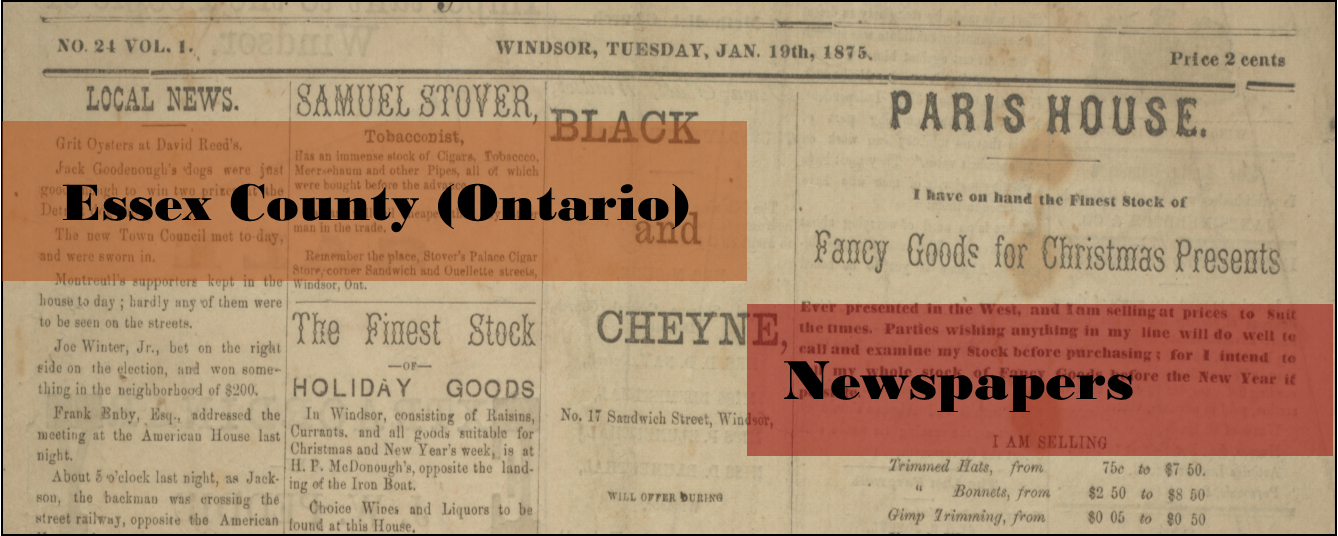
Files
Download Full Text (16.4 MB)
Place of Publication
Sandwich (Ontario)
Description
Title Variations
Western Mercury and Great South-western Railway Advocate
Great South-western Railway Advocate
Former Title
British Canadian: the Western Mercury may be a continuation of the British Canadian. The two newspapers shared a business office. On page 2 of the Feb. 25, 1858 issue, the editor writes “All parties indebted to this office for the 1st vol., British Canadian or for printing, or advertising, are requested to make immediate payment.” The newspapers also share the same motto: Our country’s welfare first, and then, we stand by honest party men. Furthermore, the numbering of the Western Mercury seems to continue the numbering of the British Canadian. However, the two newspapers have different editors, different political perspectives (based on content in existing issues), and were published on different days.
Publication Dates
1857: Nov.? (Vol. 2: no. 1) – 1859?
This assumes a continuation in the numbering from the British Canadian.
Frequency
Weekly
Online Holdings
1858: Feb. 18 (Vol. 2 : no. 14) 4p.
1858: Feb. 25 (Vol. 2 : no. 15) 4p.
1858: Mar. 25 (Vol. 2 : no. 19) 4p.
1858: Apr. 15 (Vol. 2 : no. 22) 4p.
Keywords
Western Mercury (Sandwich), Great South-western Railway Advocate (Sandwich), Sandwich (Ontario), Windsor (Ontario), Essex County (Ontario), Newspapers
Disciplines
Canadian History | Public History
Rights
Public Domain


Comments/Notes
The Western Mercury (Sandwich) was a weekly newspaper, published every Thursday morning by Alexander Riggs McClenaghan (1826-1904). Alexander McClenaghan spent most of his life in Woodstock, Ontario, where he was postmaster for about 30 years. He was also involved in the publication of the Simcoe Standard and the Woodstock Times.
The Western Mercury and Great South-western Railway Advocate began around November 1857 and continued until at least July 1859. It cost ten shillings per year, in advance. For the most part, it contained standard content for its time: poetry, prose, advertisements, notices (including some concerning railway infrastructure), court convictions, bylaws, and a mixture of international, national, and local news. One interesting short article is a petition by the black citizens of Sandwich against the segregation of schools (1858: Feb. 18, p. 3).
During the mid-nineteenth century, there was a push to build railways across the province. Railway construction was potentially very lucrative for business investors, but also ended up being rife with corruption. Around 1856, there was a conflict between Samuel Zimmerman and Isaac Buchanan over the rights to build the “southern railway”, a line that would run roughly along the shore of Lake Erie, from the Niagara River to the Detroit River. This dispute was actually more or less settled by mid 1857. However, there was some serious political fallout. Arthur Rankin, who was the elected representative for Essex County in the Legislative Assembly, was found to have played the two parties against each other for his own personal financial gain. See the Toronto Globe for legislative committee testimony into the affair. In the subsequent election over the 1857/1858 New Year, Rankin lost his seat to John McLeod, a local businessman. It was a bitterly fought campaign with much acrimony and even violence. The contest was covered in detail by local newspapers. The Western Mercury supported Arthur Rankin and, indirectly, Samuel Zimmerman. The Maple Leaf (Sandwich and Amherstburg) supported John McLeod and, indirectly, Isaac Buchanan. Both men were conservatives and both actually supported the construction of this railway line. Ultimately, it was not completed until 1873.
Katharine Ball: Updated January 19, 2021
Source of Digitized Holdings
Museum Windsor
Other Potential Holdings
National Library Canada 1858: April 22 and 1859: July 30
To view online at the Internet Archive: https://archive.org/details/western-mercury-sandwich-ontario